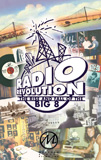 BUY IT NOT AT AMAZON: CLICK HERE!
BUY IT NOT AT AMAZON: CLICK HERE!
STUDIO: Markham Street Films
MSRP: $27.98
RATED: NR
RUNNING TIME: 72 Minutes
SPECIAL FEATURES:
• The Detroit Music Scene and the Big 8
• Funky Chicken on Swingin Time
• Did You See the Bullet Hole? (a 20/20 confession)
• Behind closed doors and on-the-air at the private 2002 Big 8 Reunion
• Swinghammer Time! (The soundtrack recording sessions)
• Jingling All the Way – why some people sing and others go into Radio!
• Plus Extra Stories, anecdotes and outtakes from D.J.s, Staff and Stars, and a huge gallery of production photographs, vintage stills and artwork.
Note to our readers in Austin, Texas: Radio Revolution is playing tonight at the Alamo Drafthouse Downtown!
The Pitch
"What if the course of American rock radio – and rock music itself – were influenced by one Canadian radio station? It was."
The Humans
Various Big 8 DJs and staffers, Alice Cooper, Wayne Kramer
The Nutshell
Located just across the water from Detroit, the Big 8 was a high powered radio station that single-handedly changed the very direction of rock radio. They pioneered a format that’s familiar to everyone who listened to radio in the 70s and 80s – deep voiced DJs giving snappy patter up through the opening of songs (stopping just at the moment the vocals kicked in), quick, catchy jingles, and purple-prosed newscasts. The Big 8 also had a secret weapon – secretary Rosalie Trombley, a middle aged single mom who was so good at picking the hits the station made her the programmer, and who even Elton John listened to when it came time to pick his next single. The station, which was so high powered it could often be heard all across America, dominated the Detroit market until Canadian laws changed, enforcing a minimum amount of Canadian content on every radio station.
The Lowdown
In 2006 the radio dial is more barren than ever. There’s plenty of noise being made on the radio, but most of it is nonsense, and what’s worse is that it’s the same nonsense wherever you go – a few big companies own stations across the nation and play the exact same crap everywhere. You can go to most major cities in America today and hear the same limp Jack FM format.
Radio Revolution is a nostalgic look back at a time when one station could have enough individual identity to stand far above the rest of the rabble – and, ironically, influence other radio stations to take on that identity. It zips by at about 70 minutes, just a little bit longer than the power hour blocks upon which the station based its format, but Radio Revolution doesn’t feel too short – the filmmakers manage to squeeze not just a lot of history but a lot of great music in there, too.
The most interesting aspect of the film is seeing how the station interacted with history. While Canada and the US shared a language and a culture, the water of the Detroit River really separated two worlds – in Windsor all was suburban bucolic happiness, while in the Motor City life was getting more squalid, and more dangerous. It all came to a head during the 1967 Detroit Riot, which was really more like an uprising. The Big 8 straddled these worlds, programming the best Motown music for the white teens of Windsor.
On many levels the film’s a hagiography of the station, a love letter to a distant time. The brazenly sensationalist 20/20 news reports get off pretty easily here, even though I think they set the stage for some very extremist style negative reporting in the decades to come. In fact, in many ways the Big 8 was a station that steamrolled the past, making way for the radio of the present. I would have liked to see the film talk a little bit more about the ways the Big 8 contributed to the overclocking of culture, among other things, but that’s not the point of Radio Revolution. And it shouldn’t have to be – sometimes all you want to do is remember it the way it used to be.
The Package
Radio Revolution is presented in fullscreen. The film is made up of modern interviews, possibly done on video, and archival material, so you’re not using this as a demo disc. That said, the soundtrack is great, and bottom heavy, very much replicating the “boom thump” of Big 8’s sound.
There’s a bevy of extras as well, including plenty of stuff about the 2002 reunion of the Big 8 staff. There are also some extra bits that seem like deleted scenes; I wish a couple had been kept in, especially a great examination of the racial aspects of Detroit’s music scene.
8.6 out of 10